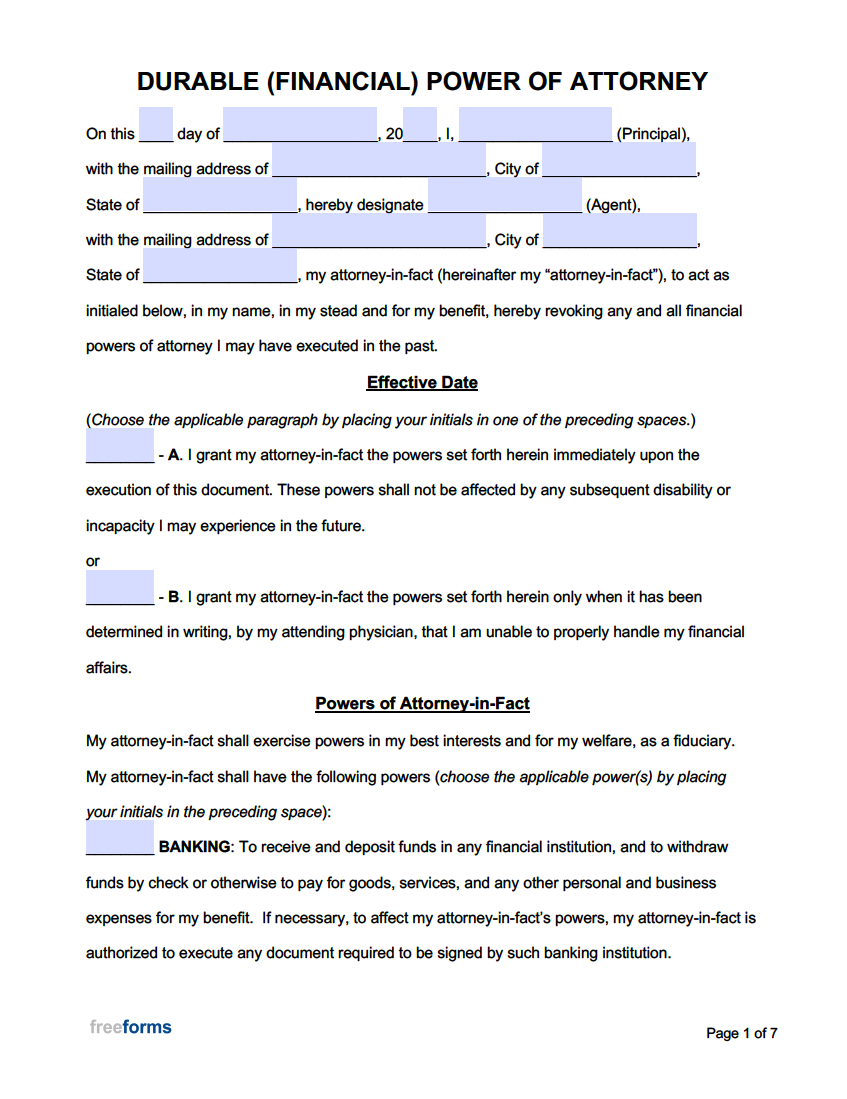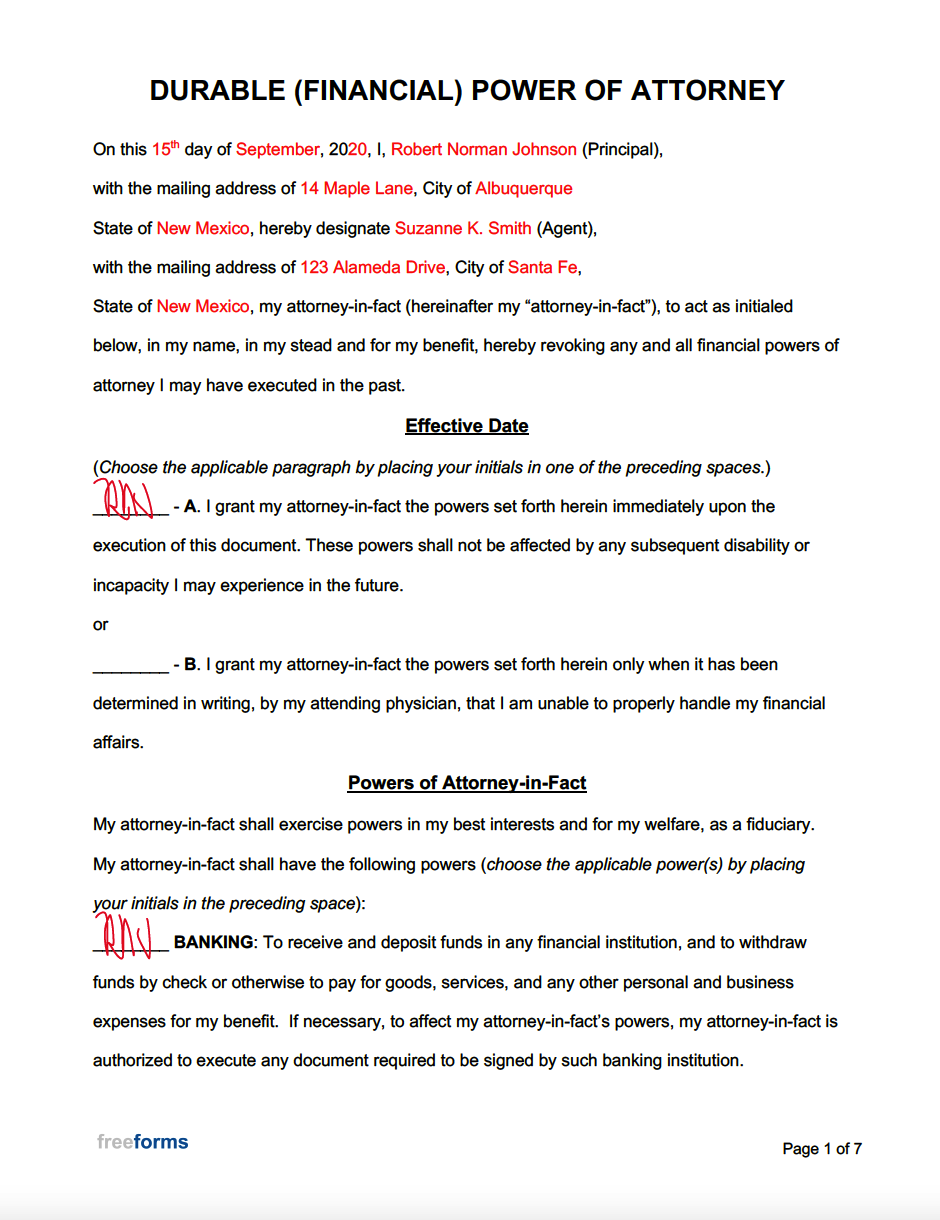A power of attorney assigns an “agent” or “attorney-in-fact” to act in the place of another (known as the “principal”) for certain personal affairs. These affairs could relate to the management of one’s estate, healthcare, or parental authority depending on the type of POA executed. Each version of this instrument will generally require information pertaining to both parties, a description of the powers that are to be delivered, and the signature of the principal which typically necessitates the acknowledgment of witnesses and/or a notary public. Following the document’s completion, the appointed individual will possess the legal authority to carry out any of the assigned tasks described within the original form.
By State
- Alabama
- Alaska
- Arizona
- Arkansas
- California
- Colorado
- Connecticut
- Delaware
- Florida
- Georgia
- Hawaii
- Idaho
- Illinois
- Indiana
- Iowa
- Kansas
- Kentucky
- Louisiana
- Maine
- Maryland
- Massachusetts
- Michigan
- Minnesota
- Mississippi
- Missouri
- Montana
- Nebraska
- Nevada
- New Hampshire
- New Jersey
- New Mexico
- New York
- North Carolina
- North Dakota
- Ohio
- Oklahoma
- Oregon
- Pennsylvania
- Rhode Island
- South Carolina
- South Dakota
- Tennessee
- Texas
- Utah
- Vermont
- Virginia
- Washington
- West Virginia
- Wisconsin
- Wyoming
By Type (12)
- Advance Directive (Medical POA & Living Will)
- Durable (Financial) Power of Attorney
- General (Financial) Power of Attorney
- IRS Power of Attorney (Form 2848)
- Limited (Special) Power of Attorney
- Living Will
- Medical Power of Attorney
- Minor Child Power of Attorney
- Motor Vehicle Power of Attorney
- Real Estate Power of Attorney
- Revocation of Power of Attorney
- State Tax Filing Power of Attorney
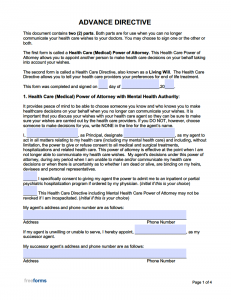 Advance Directive (Medical POA & Living Will) – This is a document that combines a medical power of attorney with a living will, creating an instrument where the principal can stipulate what is to occur should they become incapacitated and who will have the authority to make decisions on their behalf.
Advance Directive (Medical POA & Living Will) – This is a document that combines a medical power of attorney with a living will, creating an instrument where the principal can stipulate what is to occur should they become incapacitated and who will have the authority to make decisions on their behalf.
Download: Adobe PDF, MS Word (.docx)
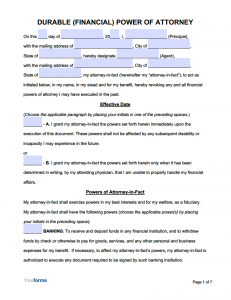 Durable (Financial) Power of Attorney – Delegates financial decision-making powers to someone else. The term “durable” means the form remains in effect even if the principal is no longer able to make decisions for themselves.
Durable (Financial) Power of Attorney – Delegates financial decision-making powers to someone else. The term “durable” means the form remains in effect even if the principal is no longer able to make decisions for themselves.
Download: Adobe PDF, MS Word (.docx)
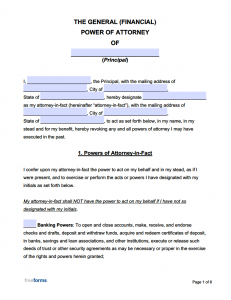 General (Financial) Power of Attorney – Equips an agent with financial powers so that they may perform transactions in the primary individual’s name and does not remain effective if the principal is considered incapacitated.
General (Financial) Power of Attorney – Equips an agent with financial powers so that they may perform transactions in the primary individual’s name and does not remain effective if the principal is considered incapacitated.
Download: Adobe PDF, MS Word (.docx)
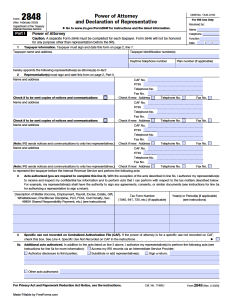 IRS Power of Attorney (Form 2848) – Distributed by the Internal Revenue Service, this document is used to grant an agent (typically an accountant or attorney) the ability to conduct tax filings and receive paperwork on the taxpayer’s behalf.
IRS Power of Attorney (Form 2848) – Distributed by the Internal Revenue Service, this document is used to grant an agent (typically an accountant or attorney) the ability to conduct tax filings and receive paperwork on the taxpayer’s behalf.
Download: Adobe PDF
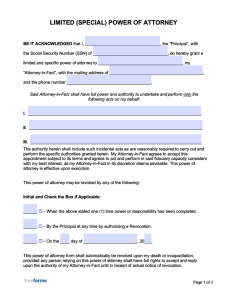 Limited (Special) Power of Attorney – Instead of issuing broad sweeping powers, individuals can utilize this POA to delegate a more specific task by outlining the exact authority that they wish to convey.
Limited (Special) Power of Attorney – Instead of issuing broad sweeping powers, individuals can utilize this POA to delegate a more specific task by outlining the exact authority that they wish to convey.
Download: Adobe PDF, MS Word (.docx)
 Living Will – Helps users to record their desired procedure regarding situations involving them being on life support.
Living Will – Helps users to record their desired procedure regarding situations involving them being on life support.
Download: Adobe PDF, MS Word (.docx)
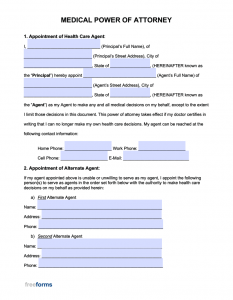 Medical Power of Attorney – Strictly allows a person to choose someone else to act as their health care agent in case the patient is no longer able to make decisions for themselves.
Medical Power of Attorney – Strictly allows a person to choose someone else to act as their health care agent in case the patient is no longer able to make decisions for themselves.
Download: Adobe PDF, MS Word (.docx)
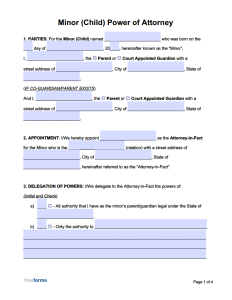 Minor Child Power of Attorney – Grants someone else the concurrent authority to care for the principal’s child during their absence, allowing the agent to sign off on any of the minor’s medical, dental, or educational needs.
Minor Child Power of Attorney – Grants someone else the concurrent authority to care for the principal’s child during their absence, allowing the agent to sign off on any of the minor’s medical, dental, or educational needs.
Download: Adobe PDF, MS Word (.docx)
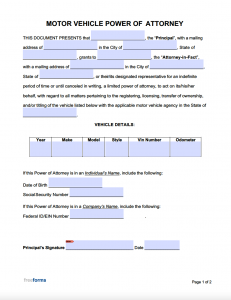 Motor Vehicle Power of Attorney – Allows the owner of an automobile to select someone else to perform transactions related to the titling, registering, selling, or purchasing of their vehicle.
Motor Vehicle Power of Attorney – Allows the owner of an automobile to select someone else to perform transactions related to the titling, registering, selling, or purchasing of their vehicle.
Download: Adobe PDF, MS Word (.docx)
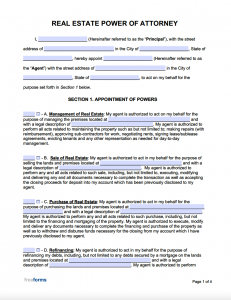 Real Estate Power of Attorney – A person who is unable to be present during the time of a transaction related to real estate may implement this document to allow someone else to handle the management, financing, purchasing, or selling of a specified property.
Real Estate Power of Attorney – A person who is unable to be present during the time of a transaction related to real estate may implement this document to allow someone else to handle the management, financing, purchasing, or selling of a specified property.
Download: Adobe PDF, MS Word (.docx)
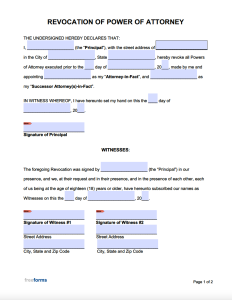 Revocation of Power of Attorney – Cancels an existing power of attorney immediately or on a scheduled date. (Notice of the revocation must be delivered to the agent in order to ensure that they are aware of the original document’s termination.)
Revocation of Power of Attorney – Cancels an existing power of attorney immediately or on a scheduled date. (Notice of the revocation must be delivered to the agent in order to ensure that they are aware of the original document’s termination.)
Download: Adobe PDF, MS Word (.docx)
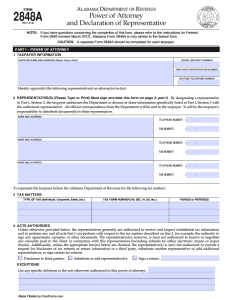 State Tax Filing Power of Attorney – Each state within the U.S. offers its own POA for designating tax matters to a third (3rd) party. Users can choose the state that corresponds to them in order to acquire the form that is applicable to their jurisdiction.
State Tax Filing Power of Attorney – Each state within the U.S. offers its own POA for designating tax matters to a third (3rd) party. Users can choose the state that corresponds to them in order to acquire the form that is applicable to their jurisdiction.
What is a Power of Attorney?
A power of attorney gives another person the authority to conduct matters on your behalf and can serve multiple different purposes based on the needs of the executor. Once a POA has been properly filled out and endorsed, the attorney-in-fact will have the capacity to acquire personal documents, sign paperwork, and perform any other operation as it pertains to the authority granted.
How to Get Power of Attorney (5 Steps)
In the past, most individuals who wished to provide power of attorney to another person would hire the services of a lawyer to draw up a contract outlining the terms of the arrangement. Luckily in this day and age, trusted websites such as ours offer the public resources that allow them to establish their own POA relationship, making it a more simple and affordable endeavor for those who do not wish to pay high attorney fees. Follow the steps below to better understand the process.
- Step 1 – Select Your Powers
- Step 2 – Establish a Structure
- Step 3 – Choose an Agent
- Step 4 – Create a Power of Attorney Form
- Step 5 – Sign and Notarize
Step 1 – Select Your Powers
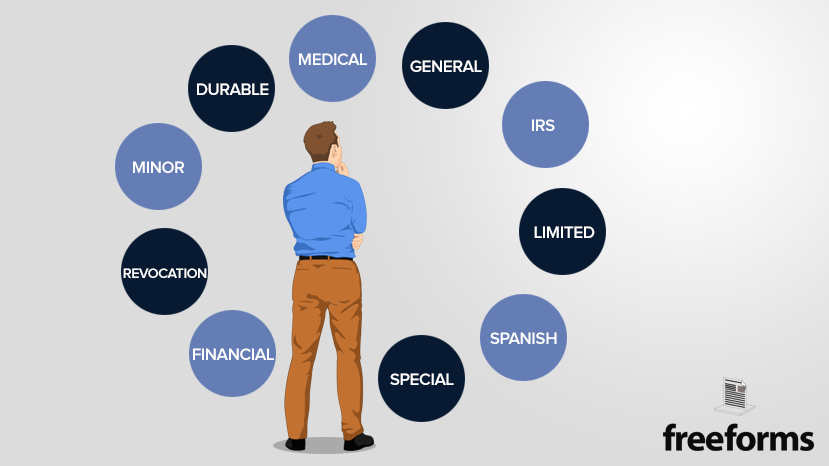
Which power are you in need of giving to another individual? That is the question you, the principal, need to ask yourself. The three (3) main types of power that one can delegate to an agent include:
- Financial – This can authorize an agent to carry out transactions related to the principal’s property (real or personal), banking, investments, business dealings, insurance, litigation, benefits, and taxes.
- Medical – The authority to make health care decisions for the principal which usually only takes effect once they have become incapacitated and are not able to vocalize their desires regarding life-sustaining treatments.
- Parental – Grants another person some of the same rights a parent would have in regard to the care of a child, allowing them to perform actions concerning the minor’s medical/dental treatment, schooling, and extracurricular activities.
Step 2 – Establish a Structure
Now that you have determined the type of power that you wish to grant, it is time to think about which format best suits your needs. Read the bullet points below to explore the available options:
- Durable – The meaning of the word “durable”, when used in a POA document, means that the terms contained within the instrument will remain intact even if the principal should fall into an incapacitated state. Most people seek this format, as their primary goal is to provide a trusted individual with the capability of managing their estate should they be unable to do so themselves in the future.
- General – Those that wish for the arrangement to end at the time of their incapacity can choose this non-durable option that automatically terminates once they are no longer able to function for themselves.
- Springing – This is a variation of the durable format where a completed POA only takes effect once the principal has become incapacitated, whereas a document that is strictly durable is effective immediately. (Certain states do not allow this type of document, check your local legislation to see if this is a possibility.)
Review the types of POA documents above to see which one meets your criteria. Although some may not mention the aforementioned formats in the title, most of them allow you to select your desired term within the content of the form.
Step 3 – Choose an Agent

When choosing an agent to act on your behalf, it is important that you pick someone who is trustworthy and reliable, especially if the POA being executed is durable. The type of person you nominate as your attorney-in-fact can vary depending on the circumstances of the arrangement, here are some examples of potential candidates to fill the position:
- Family Member – The majority of individuals will grant power of attorney to their spouse, child (if they are 18 or older), or another close relative, especially when the document conveys authority over their estate or medical treatment.
- Close Friend – If a family member is not an option, issuing parties may consider a close friend that they feel has their best interest in mind.
- Professional – For certain types of POA documents, it may be appropriate to name a hired professional who is credible as your agent; such as an accountant, attorney, real estate agent, assistant, or caretaker.
Step 4 – Create a Power of Attorney Form
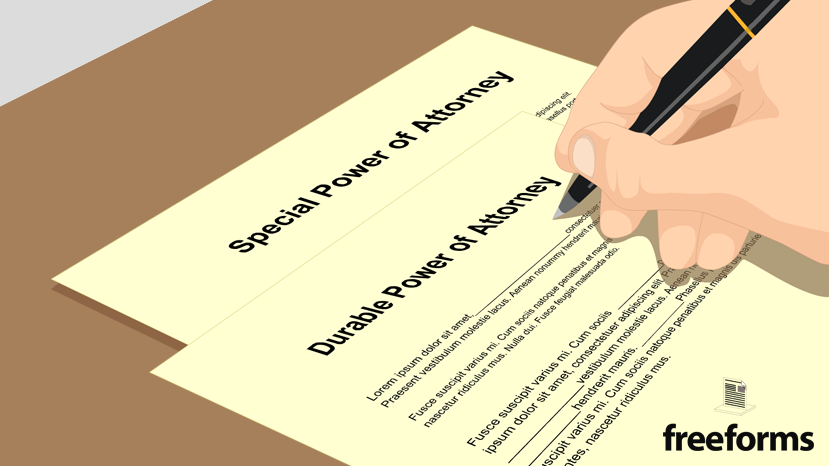
It’s time to put the details of the arrangement to paper now that you have established your requirements. Be sure that the document selected coincides with the state in which your agent will be carrying out tasks in your name (state-specific forms available above). Although each POA form will differ in terms of its layout, they will all generally require the same formula, which includes the recording of information concerning the:
- Participants – The names and addresses of all parties involved (principal & agent).
- Powers – An indication of the types of authority that will be provided to the attorney-in-fact.
- Special Instructions – A description of any additional provisions concerning the principal-agent relationship that may restrict or increase the range of authority.
- Effective Date – The day, month, and year in which the content of the document will go into effect.
Step 5 – Sign and Notarize
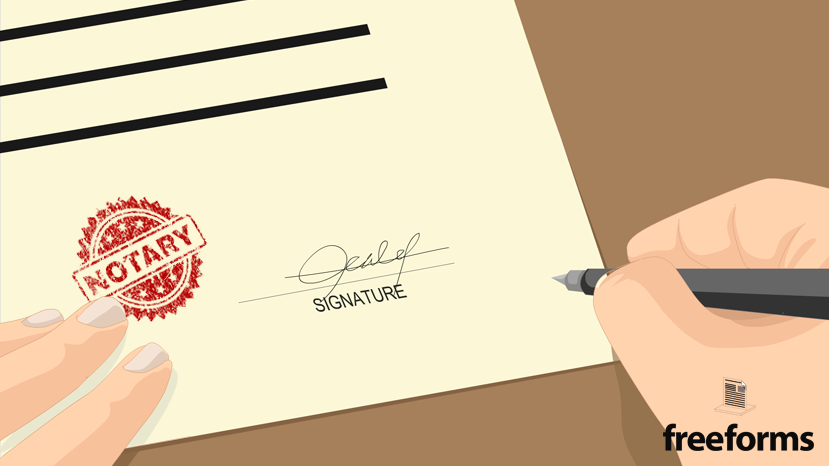
Once the document has been filled out and customized to the liking of the principal, they will be required to sign it. Before this action is performed, it is important to research your local laws to ensure that the endorsement is valid. Most states will require that you sign in the presence of witnesses and/or a notary public to further certify the legitimacy of the instrument. This can be achieved:
- In person – Various locations provide notary services, such as a bank or UPS Store.
- Online – Certain websites offer online notarization, one of the most popular being Notarize.com.
Frequently Asked Questions (FAQ)
What does power of attorney mean?
Power of attorney is the act of giving another person the legal authority to perform certain assigned tasks in your name.
Who can override a power of attorney?
This can vary depending on several different factors and the overall content of the existing POA. First off, the principal (the individual who originally granted the authority) always reserves the right to revoke the terms of an active POA at any time. The only time this may not be possible is if the document is durable and the grantor has become incapacitated. If this is the case, and another party who is connected to the principal feels that the agent should no longer possess the right to act in their place, they could potentially petition the court to suspend the authority and appoint them as an adult guardian or conservator. With that said, it is a very difficult process and is only worthwhile if there is sufficient evidence that the attorney-in-fact violated the terms of the contract.
How to sign as power of attorney?
When an agent signs a document on the principal’s behalf, they must execute it in the following format:
- (Principal’s Name) by (Attorney-in-Fact’s Signature) as Agent
Does a power of attorney end at death?
Yes. If the principal of a POA passes away, the instrument will automatically become void and the agent will no longer have the legal right to act on their behalf.
How to become an agent with power of attorney?
In order to acquire power of attorney, you will need to receive written permission from the individual you will be acting for. This comes in the form of a legal document that contains all the necessary clauses required by the state in which the authority is being conveyed. The party granting the powers must indicate who is involved, what privileges the agent will have access to, and what the limitations will be surrounding the arrangement. Once the instrument is signed by the principal and acknowledged according to state law, the agent will have the ability to represent the grantor concerning any of the matters listed within the content of the document.
How to revoke power of attorney?
Whenever one decides that they want to revoke power of attorney from their agent, it is imperative that they do so in writing. This can be achieved by:
- Filling out a revocation form.
- Signing it, preferably in the presence of witnesses and/or a notary public (may actually be required in some states).
- Providing a copy to the attorney-in-fact and any institutions that may have the POA on file as notice of the cancellation.
- Preserving a copy for your records.
Does a power of attorney need to be notarized?
Most states require a power of attorney to be notarized and/or witnessed by attesting individuals to legally take effect. Check with your local state requirements to see if this is a necessary measure. Regardless of whether or not it is mandated by local legislation, it is never a bad idea to have your document certified by a public official in order to further confirm its authenticity.
Sample Power of Attorney Form
Download: Adobe PDF, MS Word (.docx)
